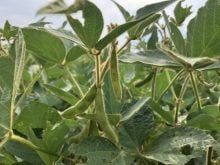The long-awaited House of Commons agriculture committee report on competitiveness in the agriculture industry is largely a case of opposition MPs saying the government is not going far enough and Conservatives disagreeing.
In a prime example, the opposition majority recommended that the federal government get tough with South Korea in the dispute over beef access, making public a list of Korean goods that would face Canadian retaliation if the World Trade Organization rules for Canada in the dispute.
“The goods should be targeted in such a way as to maximize the economic consequences for South Korea,” said the main report tabled in Parliament May 6. “The committee believes this situation cannot continue and that it is time to give up on ‘amicable diplomacy.’”
Read Also

Fall rye hits record high in Manitoba
Winter cereals 2025: More Manitoba fields grew fall rye in 2025 than ever before, but winter wheat slipped and, while spring stand survival was good, drought took its toll
In a minority report, the Conservatives called it “an extremely counterproductive recommendation.”
The opposition majority recommended that some of the $50 million announced by the federal government for the packing industry include direct grants as well as repayable loans. The Conservatives said the current program loan rules are fine.
The opposition called on the Competition Bureau to investigate the impact of the “captive supply” issue that sees packing plants owning cattle that critics say they use to keep market prices down. The National Farmers Union flagged the issue at the committee and the opposition MPs said they want a report on the issue by Oct. 1, 2010.
The Conservatives said they disagree with the NFU analysis but suggested “a review of the entire beef value chain” to find ways to improve producer income.
But there also were some common points supported by both sides of the table.
The committee said the Competition Bureau should clarify its role in investigating competition among farm input suppliers and output buyers and should study the fertilizer industry’s pricing and marketing practices, including limiting production to keep prices high.
The committee also recommended that Agriculture Canada work with the Competition Bureau to “undertake a study to explore competition issues affecting the agricultural sector in the 21st century and the appropriate role for competition and regulatory enforcement in that sector.”
The MPs singled out concentration in the supplier and retailer sectors and what many farm witnesses complained was a growing market imbalance.
The committee also urged the federal government to study “the level to which imported agricultural products do not meet the same standards required of Canadian producers and provide recommendations, which can be implemented to resolve this matter.”
Many witnesses complained that while they often are denied access to farm chemicals or pharmaceutical products available in competitor countries, products from those countries come into Canada and compete with domestic producers who do not have the same input tools.
MPs recommended that the government meet a request from agri-retailers that money be made available to help them protect their supplies of fertilizer and other materials that could be used to make explosives.
The committee endorsed the government’s food export agenda that includes negotiating free trade deals around the world. The report noted the NFU analysis that since 1985, Canadian food sold into international markets has been worth $802 billion but just $3 billion of that has stayed with farmers “while agribusiness corporations were able to capture the other $799 billion.”
The Conservatives argued that if the committee majority supports increased exports through trade deals, then the Colombia-Canada Free Trade deal now being held up by New Democrat and Bloc Québécois MPs should be approved.
The Conservative MPs on the committee also called on their own government to introduce legislation to end the Canadian Wheat Board wheat and barley monopoly.














